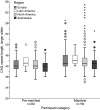Data Analytics from Enroll-HD, a Global Clinical Research Platform for Huntington's Disease
- PMID: 30363395
- PMCID: PMC6174428
- DOI: 10.1002/mdc3.12388
Data Analytics from Enroll-HD, a Global Clinical Research Platform for Huntington's Disease
Abstract
Background: The study of complex neurodegenerative diseases is moving away from hypothesis-driven biological methods toward large scale multimodal approaches, requiring standardized collaborative efforts. Enroll-HD exemplifies such an integrated clinical research platform, designed and implemented to meet the research and clinical needs of Huntington's disease (HD). The aim of this study was to describe the unique organization of Enroll-HD and report baseline data analyses of its core study.
Methods: The Enroll-HD platform incorporates electronic data capture, biosampling, and a longitudinal observational study spanning four continents (ClinicalTrials.gov Identifier: NCT01574053). The primary study population includes HD gene expansion carriers (HDGECs; CAG expansion ≥36), subdivided into manifest/premanifest HD. The control population consists of genotype-negative first-degree relatives and family controls not genetically related. The study includes 10 core clinical assessments covering motor, cognitive, and behavioral domains.
Results: This data set comprises 1,534 participants (HDGEC = 1,071; controls = 463). Participant retention was high; 42 participants prematurely withdrew from the study. Mean ± standard deviation SD CAG repeat size was 43.5 ± 3.5 for HDGECs and 19.8 ± 3.4 for controls. Motor and behavioral assessments identified numerical differences between controls and HDGECs (manifest > premanifest > controls). Functional and independence assessments were generally similar for the premanifest and control groups with overlap in range of scores obtained. For the majority of cognitive tests, there were large differences between participants with manifest HD and all other groups.
Conclusions: These first data from the Enroll-HD clinical research platform demonstrate the maturity and potential of the platform in collecting high-quality, clinically relevant data. Future data sets will be substantially larger as the platform expands longitudinally and regionally.
Keywords: Huntington's disease; observational study; research platform.
Figures



References
-
- Organization for Economic Co‐operation and Development (OECD) . Dementia Research and Care. Paris: OECD Publishing.
-
- Pringsheim T, Wiltshire K, Day L, Dykeman J, Steeves T, Jette N. The incidence and prevalence of Huntington's disease: a systematic review and meta‐analysis. Mov Disord 2012;27:1083–1091. - PubMed
-
- Kay C, Fisher E, Hayden MR. Epidemiology In: Bates G, Tabrizi S, Jones L, eds. Huntington's Disease, 4th ed Oxford, UK: Oxford University Press; 2014:131–165.
-
- A worldwide observational study for Huntington's disease families . http://www.enroll-hd.org. Accessed January 2016.
Associated data
LinkOut - more resources
Full Text Sources
Other Literature Sources
Medical

